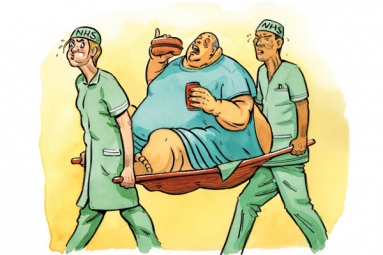
(Image source from: Canva.com)
The rising prevalence of obesity across the globe has captured significant attention over the last thirty years. In India, Body Mass Index (BMI) has traditionally served as the standard for evaluating obesity. Currently, the obesity rate in India stands at 40.3%, with regional disparities such that the southern region shows the highest rate at 46.51%, while the eastern region records the lowest at 32.96%. Additionally, abdominal obesity affects 40% of women and 12% of men in the country. Data indicates that among women aged 30 to 49, approximately 5 to 6 out of 10 are classified as abdominally obese. The correlation of abdominal obesity in women is notably stronger in older demographics, urban settings, higher income brackets, and among non-vegetarians.
For an extended period, societal views have regarded obesity as a failure tied to personal willpower and choices. While individual accountability is certainly a factor, this viewpoint oversimplifies the intricate array of elements at play in this public health crisis. It’s a complex interaction of factors including the abundance of processed foods, lack of physical activity, and societal influences that complicate making healthier decisions. Experts provide essential information regarding the issue:
Impacts of Obesity: Classified as a disease, obesity can severely harm one’s health. Individuals suffering from severe obesity are at an elevated risk for various other health conditions. These include type 2 diabetes, hypertension, high cholesterol, coronary artery disease, sleep apnea, and more.
Diabetes: A significant contributor to type 2 diabetes, obesity leads to blood sugar levels that exceed the body’s capacity to regulate.
Hypertension: A principal factor behind high blood pressure, approximately 75% of individuals with hypertension also experience obesity. This condition can escalate the risk of further ailments, including heart disease, congestive heart failure (CHF), strokes, and renal conditions.
Heart Disease: The American Heart Association identifies obesity as a key factor in the development of heart disease, with extensive studies indicating a heightened risk correlating with increased obesity.
Cancer: As one’s Body Mass Index (BMI) rises, so too does the likelihood of developing cancer, along with an increased risk of mortality from cancer. Obesity can dramatically influence physical health, leading to various health complications. However, many of these related issues can be prevented or improved through weight loss.
Available Treatments: Treatments such as Endoscopic Sleeve Gastroplasty (ESG) offer support for significant weight reduction, helping individuals reach their targets more swiftly. This minimally invasive procedure employs an endoscopic stitching device to reduce the size and capacity of the stomach by approximately 70%.
Patients who undergo endoscopic sleeve gastroplasty typically lose about 12% to 20% of their total body weight within a year. When these treatments are integrated with lifestyle changes, exercise, and behavioral therapies, they have been shown to yield positive outcomes and mitigate the risks associated with obesity.
The issue of obesity is multifaceted and lacks straightforward remedies. However, through personal efforts, backing community programs, changing healthcare practices, and promoting public policies, we can combat this hidden epidemic and work towards a healthier tomorrow for ourselves and future generations. Take action now rather than postponing until it may be too late. Begin implementing changes today.



















